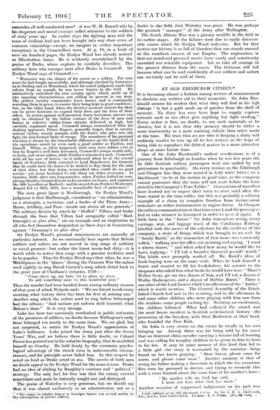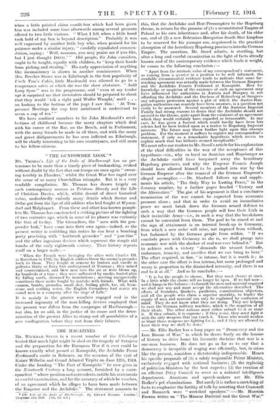AN OLD EDINBURGH CITIZEN.*
Ir is becoming almost. a fashion among writers of reminiscences to disclaim any written aid to their memories. Sir John Mac- donald assures his readers that what they will find in his Life. Jottings " is but a quilt made up of patches from the shelf of memory. No diary has ever been kept to supply copious extracts such -as too Often give anything but light reading." Every writer is free, no doubt, to use such materials as he chooses, but it is not clear why memory should be either a more trustworthy or a more amusing vehicle than notes made at the time. We trust that no one who is keeping a diary will suddenly resolve to tear up all he has written in the hope of being able to reproduce the deleted matter in a more attractive shape at some future time.
One of Sir John Macdonald's earliest recollections is of a journey from Edinburgh to London when lie was five years old. In 1841 Scottish railway passengers were not misled by any pretensions to punctuality. On every station on the Edinburgh and Glasgow line they were warned in bold white letters on a blackboard "to be at the station in good time, as the company cannot guarantee that the train will not start before the hour stated in the Company's Time Tables." Generations of travellers have learned not to expect their train to start until after the hour stated in the time-tables, but this was probably a solitary example of a claim to complete freedom from inconvenient restraints on either stationmaster or engine-driver. At Glasgow the railway communication at that time ceased, and the passengers had to take steamer to Liverpool in order to meet it again. A little later in the " forties " Sir John remembers seeing every carriage, seat, and luggage truck of the Caledonian Railway labelled with the names of the solicitors for the creditors of the company, a state of things which was brought to an end by Sandy Baird," as the ironmaster of that name was commonly called, walking into the office one morning and saying, ' I want a wheen Shares,' " and When asked how many he would like to have, replying : " I'll tak a haunder thoosand pounds' worth." The labels were promptly washed off. Mr. Baird's ideas of book-buying were on the same scale. When he built himself a house and wanted to fill his bookshelves, his answer to the shopman who asked him what books he would have was: " There's Walter Scott, gie me twa dizzen of him, and I'll tak a dizzen o' Wullie Shakespeare, and a dizzen of Rabbie Burns." There is one other of the Lord Justice-Clerk's recollections of the " forties " which is worth -mention. The General Assembly of the Estab- hailed. Church had met in the morning, and in the afternoon he and some other children who were playing" with him saw from the windows some people rushing by. Scenting an excitement, the children followed. What had collected the crowd was the most heroic incident in Scottish ecclesiastical history—the procession of the Seceders, with their Moderator at their head, who founded the Free Kirk.
Sir John is very severe on the errors he recalls in his own bringing up. Among these was his being told by his nurse that an itinerant china-mender carrying a brazier full of burning coal was calling for naughty children to be given to him to burn in his fire. It may be some menace of this kind that led to a little girl—the story is warranted by the narrator—being found on her knees praying : " Dear Satan, please come for nurse, and please come soon." Another memory is that of seeing his father making a decoction in which the too numerous flies soon lay poisoned in dozens, and trying to reconcile this with a verse learned about the same time at his mother's knee " My mother tells me God has said, I must not hurt what God has made."
Another occasion of suppressed indignation on his part was.
- —*Life Joffingi-of • an-Old Ediabtorgh rigiV91. hy Sir J. H. A. • Nr,t4 Aoki, P.C., Lord Justice-Ciert. Loedou.: T. N. lolls. • ilk* ket,,,y • when a little painted china comfit-box which had been given him was included some time afterwards among several presents offered to two little visitors. " What I felt when a little hand took hold of my box is beyond description." Probably it was well expressed by another little boy who, when praised for his patience under a similar injury, " candidly repudiated commen- dation, saying : Well, mamma, you may praise me if you like, but I just thought DEVIL.' " Old people, Sir John considers, ought to be taught, equally with children, to "keep their hands from picking and stealing." His early appreciation of anything like- inconsistency is. shown in another reminiscence. When Mrs. Beecher Stowe was in Edinburgh in the first popularity of Uncle Tom's Cabin, little Macdonald was allowed to go to a temperance soirée at which she was the show abstainer. " Auld Lang Syne " was in the programme, and " even at my tender age it surprised me that teetotalers should be prepared to shout that they would ' tak a right gind Wullie Waught,' until . . on looking to the bottom of the page I saw this : ' At Tem- perance Meetings the cup here mentioned is understood to mean a cup of tea.' "
We have confined ourselves to Sir John Macdonald's recol- lections of childhood because the many chapters. which deal with his career at the Bar, on the Bench, and in Parliament, with the many friends he made in all three, and with the many and grave disfigurements he has seen inflicted on Edinburgh, will be chiefly interesting to his own countrymen; and still more to his fellow-citizens.



































 Previous page
Previous page